Search Results
Showing results 161 to 180 of 187

Seeing Is Believing
Source Institutions
This activity is designed to accompany the PBS documentary about African-American chemist "Percy Julian: Forgotten Genius." Learners look through two cups with small holes in them to simulate what it'

Artificial Intelligence: The Intelligent Piece of Paper
Source Institutions
This activity explores what it means for a computer to be intelligent and introduces the topic of what a computer program is and how everything computers do simply involves following instructions writ

Maritime Munchies
Source Institutions
In this activity, learners follow simple historical maritime recipes to cook up hardtack and swanky, and then compare the foods they eat to what was served on ships in the past.

Cleaning Water with Dirt
Source Institutions
In this activity on page 7 of the PDF (Water in Our World), learners make their own water treatment systems for cleaning water.

Egyptian Measuring
Source Institutions
In this activity, learners compare the ancient Egyptian system of measurement, which was based on body lengths, to the customary and metric systems used today.

Monitoring Amphibians
Source Institutions
In this field study, learners discover how to collect data in the field and how their efforts can help certain animals, specifically, amphibians.

Homework, Hogwarts Style
Source Institutions
In this activity on page 8 of the PDF (Behind the Scenes with Chemistry), learners make three of Harry Potter's essential school supplies: quills, ink, and color-changing paper.

Information Hiding: Sharing Secrets
Source Institutions
This activity about cryptographic techniques illustrates a situation where information is shared, and yet none of it is revealed.
Windmills
Source Institutions
In this physics activity (page 8-9 of the PDF), learners will explore wind energy. They will build their own windmill and see how energy from wind can be converted into a useable form.
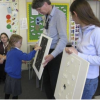
Natural Selection Because of Different Color: Camouflage
Source Institutions
In this activity (p.5-6 of PDF), learners investigate natural selection. Learners discover that natural selection, which takes place over decades, can lead to altered populations within a species.
We Have Capture!
Source Institutions
Using simple materials, learners will construct the end effector (grasping device) of a robotic arm and use the device to capture and pick up an object.

The Power of Graphene
Source Institutions
This lesson focuses on graphene and its electrical properties and applications.

Heat Capacity: Can't Take the Heat?
Source Institutions
Why is ocean water sometimes the warmest when the average daily air temperature starts to drop? In this activity, learners explore the differing heat capacities of water and air using real data.
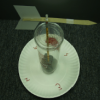
Design and Build a Wind Vane
Source Institutions
In this activity, learners design and build a simple wind vane —one of the oldest kinds of weather tools— and use it to show wind direction.
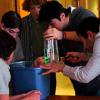
Total Internal Reflection
Source Institutions
In this activity, learners use a laser pointer, empty soda bottle, rubber plug and water to demonstrate total internal reflection.
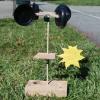
Weather Vane and Anemometer
Source Institutions
In this meteorology activity, learners construct simple devices to measure the direction and speed of wind.

Water Tower Challenge
Source Institutions
In this activity, learners explore how engineers work to solve the challenges of a society, such as delivering safe drinking water.
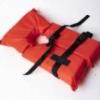
Life Vest Challenge
Source Institutions
In this activity, learners explore the engineering behind life vests or personal flotation devices and the challenges met by these devices.

Reflective Solar Cooker
Source Institutions
In this activity, learners use the Sun's energy to cook marshmallows. Learners construct the solar oven out of simple everyday materials.

Hand Biometrics Technology
Source Institutions
In this activity, learners explore how engineers incorporate biometric technologies into products as well as the challenges of engineers who must weigh privacy, security and other issues when designin
